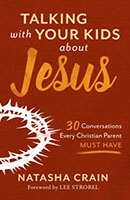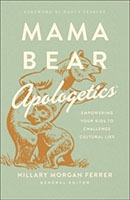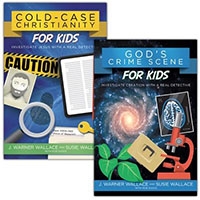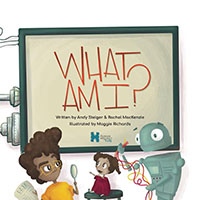Learn more about the journey that led to us equipping kids to carefully evaluate every idea they encounter.
Meet members of our team who have contributed to curriculum development.
Hear from real users of the Foundation Curriculum.
Learn what we believe about God, Jesus, Scripture, and more.
Apologetics For Kids - A True Wake Up Call!

“Good morning Miss Urbanowicz! I finished my book report last night. Oh, and you know those stories in the Bible about Jesus? I’ve decided they can’t be true.”
I don’t know about you, but I am very thankful when the crises of the day hold off until 10am, when I am fully awake and ready to embrace the day. But life rarely goes according to our desires, and this day was no different.
It was 8:51 am and one of my third-grade students had already informed me she didn’t trust the Bible. Well, those weren’t exact words here. What she said was, “Good morning Miss Urbanowicz! I finished my book report last night. Oh, and you know those stories in the Bible about Jesus? I’ve decided they can’t be true.” Then she smiled and skipped off to put her school supplies into her desk.
Talk about a rude awakening to the day. If this incident had occurred during my first year of teaching, I would have been utterly shocked.
However, after ten years of life in an elementary Christian-school classroom, I was used to conversations like this. In fact, a short survey of the 150 third through fifth graders enrolled in my school, revealed that 79 percent wondered whether they could trust the Bible. It was these types of conversations that led me to dive deep into Christian apologetics and begin creating apologetics resources for kids.
If you are investing in the spiritual formation of the next generation, and desire to equip the kids in your care with confidence in the Christian worldview, then apologetics for kids is for you! Learn more about our curriculum here or keep reading to explore some basics of apologetics and how it can be used to cultivate enduring faith in the next generation.
Contents:
- What Is Apologetics?
- Why Apologetics Is Important For Kids
- Some Practical Wisdom To Talk To Children
- Recommended Books
- Foundational Training For Children
Foundational Apologetics Curriculum
Get your kids started with an apologetics curriculum about comparing worldviews.
What is Apologetics?

The first question we must explore is, What is apologetics?
The word apologetics may sound a bit intimidating and bring to mind a stuffy university professor with a scowl on his face, or worse, an angry preacher shouting at his congregation, while thumping his Bible on the pulpit. But these images are far from the reality of the concept.
Apologetics is plain and simple – providing a rational defense of the Christian worldview. In layman’s terms, apologetics is building a case that Christianity is true.
Apologists take on the task of showing people that the Christian faith is not a blind, irrational leap in the dark. Rather, Christian faith is placing our trust in the God of the Bible, who we cannot see, because everything we can see points to Him.
Why Apologetics Is Important For Kids
So why apologetics for kids? The situation I explained in the intro highlights the why.
Our children are exposed to crazy amounts of information each day. Unless we live completely off the grid, almost every worldview on Earth has a direct channel into our homes. This massive amount of information isn’t entirely bad. However, most of our children are not prepared to evaluate the truthfulness of the ideas that bombard them daily.
In years past, it was safe to assume that daily devotions, family dinners, Bible memory programs, and weekly Sunday school lessons were enough to ground our children in the Christian worldview. This is no longer a safe assumption.
Researchers have found that while 65 percent of the US population identify as Christians, only 4 percent of US GenZers have a biblical worldview. And many teens and young adults who end up leaving the faith, do so because they do not believe Christianity tells us the truth about reality.
Like the girl in my third-grade class, our kids wonder at younger and younger ages if they can put their trust in the God of the Bible. Apologetics lays the necessary foundation kids need to understand that the claims made in the Bible actually line up with reality.
Some Practical Wisdom To Talk To Children

Apologetics for kids may be a necessary piece to spiritual formation.
But now the question becomes, How do I begin the discussion? It’s not enough to simply identify a problem. We must come up with a game plan for implementing a solution. Here are a few practical tips for starting the conversation with the children God has placed in your care.
Welcome Their Questions and Doubts
The first thing we must do as parents and teachers is cultivate an environment that welcomes questions.
During my first year teaching, none of my students would have been comfortable telling me they thought we couldn’t trust the Bible. However, as I matured as a teacher, I realized that my students had many questions brewing beneath the surface. They were just intimidated to share them, fearing I would be disappointed if they showed any uncertainty or doubt in their faith. So, I set out to make a change.
Ask The Right Questions
I started asking different questions during Bible class. Questions such as:
- Is this story true?
- How can we tell?
- What might be different in our view of life if this wasn’t true?
I also carved out space for my students to ask questions.
How Can I Start?
You may be thinking, This sounds good. But I have no idea where to begin. I don’t know anything about apologetics! If these are your thoughts, have no fear.
Just keep reading!
Recommended Books
A great place to start preparing yourself to use apologetics with kids is through books. I highly recommend you check out the resources below.
For Adults
Talking with Your Kids About…Series

This series of books by Natasha Crain walks adults through basic apologetics concepts and then provides discussion questions to use with kids. This series is a great introduction to apologetics, especially for those working with kids.

This series of books by the Mama Bear Team breaks down a number of ideas from competing worldviews in our society and then provides practical application points to use with children. This series is an excellent resource for anyone wanting to make sense of what’s going on in our culture and help kids biblically navigate the waters.
For Kids
Cold Case Christianity and God’s Crime Scene for Kids

These books have kids use the investigative skills of cold-case detective, J. Warner Wallace, to investigate the reliability of the gospels and evidence for design in the universe. Kids can even earn a detective certificate at the Case-Maker Academy!
What Am I and What Am I Worth?

This series of books, put out by Apologetics Canada, helps kids explore what it means to be human and the evidence all around them for inherent human worth.
Foundational Training For Children
Books are a great start to implementing apologetics for kids, but they are just that – a start.
In order to build a solid biblical worldview in our children, we need to both directly instruct them in the truths of the Christian worldview and equip them to carefully evaluate every idea that they encounter.
Instruction and Training To Evaluate Ideas
When I was teaching third grade, I searched high and low for materials that would help me meet both of these goals. But I couldn’t find anything that fit the bill.
So, I began studying apologetics on my own and writing materials for the students in my classroom.
The transformation in both my students’ faith and their thinking abilities shocked everyone. Before I knew what was happening, I started getting calls and emails from all over the country, requesting the materials I created.
Well, several years and one Masters degree in apologetics later, Foundation Worldview now provides resources to meet this worldview development/critical thinking need.
Whether you plan to implement our apologetics materials or create your own, here are a few tips in how to ensure your kids get the apologetics training they need.
Training for Kids
So, what should intentional apologetics training for kids look like?
Any solid apologetics training for kids should include three features:
1. A Systematic Plan
Sound apologetics training for kids will have specific end-goals in mind. Everything done from start to finish, will target those end goals.
If you are looking for materials to use with kids, look for a list of overarching goals or questions the materials cover. If those goals/questions are missing, chances are those materials aren’t focused enough to make a lasting impact.
If you plan to create materials on your own, start by sitting down and determining what you want your children to know, understand, and be able to do by the time their training is complete. Then use those goals to guide every teaching, question, discussion, and activity you include.
2. Activities that Attach Abstract Ideas to Concrete Objects
Many of the apologetics concepts children need to understand are abstract. However, children under the age of 14 may have difficulty jumping straight to the abstract.
Sound apologetics training for kids will help bridge the gap between children and abstract concepts by attaching abstract concepts to something concrete.
This idea isn’t new, it’s what we do every time we teach a five-year-old to add. We don’t start off with abstract numbers. We first give them physical blocks and then attach the abstract numeric value.
If you are looking for materials to use with your kids, investigate how/if these materials use concrete, physical objects to help kids understand abstract apologetics concepts.
If you plan to create your own materials, spend time thinking through how you can teach each abstract concept using a concrete physical example.
TRY THE FOUNDATION DIFFERENCE
FREE Activity Sheets To Try Concrete Object Lessons
3. Measurable Outcomes
Any time we want to transform the way our kids think, we need some form of measure to determine the effectiveness of what we’re doing.
If you are looking for apologetics materials to use with your kids, check to see if the materials include formal assessments. If not, investigate what materials they provide to measure the effectiveness of their resources.
If you plan to create your own materials, be sure to include some short assessment at the end of each teaching time so that you can know whether your kids understood the concepts or if they need more review.
Conclusion

Apologetics for kids may seem intimidating at first. However, by cultivating a question-friendly environment, surrounding ourselves with good books, and implementing transformational training materials, we can begin to cultivate enduring faith in our children.
I saw this happen once I implemented apologetics in my classroom.
As my student skipped off to her desk, I called her back and asked her why she thought we couldn’t trust the Bible. She shared her concerns and I listened. We had a follow-up conversation and I encouraged her to continue asking questions.
Fast forward to Easter. I had my class read through the four gospel accounts of the crucifixion and resurrection, noting the similarities and differences.
I then asked them, Do these differences show us we cannot trust the Bible?
Some students weren’t sure. But my formerly skeptical student had abandoned her skepticism. She was now confident that she could trust the gospel, and she enthusiastically explained to her classmate why the differences did not point to the accounts being false. A question-friendly environment had led her to share her doubts, and intentional apologetics training prepared her to understand why she could confidently put her trust in God and His Word.

About Elizabeth Urbanowicz
Elizabeth Urbanowicz is a follower of Jesus who is passionate about equipping kids to understand the truth of the Christian worldview. Elizabeth holds a B.S. in Elementary Education from Gordon College, an M.S.Ed. in Education from Northern Illinois University, and an M.A. in Christian Apologetics from Biola University. Elizabeth spent the first decade of her professional career teaching elementary students at a Christian school. Elizabeth now works full time on developing comparative worldview and apologetics resources for children. Her goal is to prepare the next generation to be lifelong critical thinkers and, most importantly, lifelong disciples of Jesus.
Related Posts and insights

How Do We Explain the Doctrine of Election to Kids?
How do you explain the doctrine of election to kids without causing fear? Discover how Scripture's promises bring peace and assurance to children's hearts.

Helping Your Child Understand That Love Is a Choice, Not Just a Feeling
Is love just a feeling? Learn how to teach your child that biblical love is a choice using 1 Corinthians 13, with practical weekly tips for every age group.

How to Help Your Child Through Hard Circumstances
Learn five biblical steps to walk your child through suffering and hard circumstances—from demonstrating compassion to helping them look beyond themselves.
